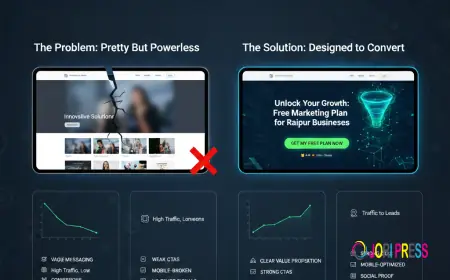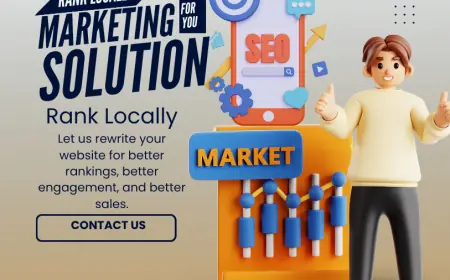How Can Online Reputation Management Elevate Your Marketing Strategy?
Learn how Online Reputation Management (ORM) builds customer trust. Discover strategies for reviews, content, and social media to foster credibility. Explore tools and FAQs to enhance trust for businesses and individuals.

In today’s digital world, a powerful marketing tool for your brand is a positive reputation. When your business has a positive presence online, it enhances your marketing efforts. Conversely, when your business has a poor reputation online, even the best marketing campaigns are at risk of failure. Online Reputation Management (ORM) can seamlessly fit with marketing to build trust, increase audience engagement, and drive conversions. The major goal of ORM is to ensure your brand is well-loved across various platforms, in alignment with your marketing goals. This guide will examine the broad strokes of the ideas behind including Online Reputation Management in your marketing plan. To begin, let us address some key questions that will improve your understanding of ORM and how to implement it.
Why is ORM a Fundamental Part of Marketing Success?
Online Reputation Management is vital as it will definitely influence how the target audiences perceive your brand. Research tells us that 87% of consumers read reviews for a product or service online before making a decision to buy. So, having a good reputation enhances the effectiveness of the campaign because consumers take action and purchase from the brands they trust, and dislike brands that people criticize online, especially when they are also provide reviews to match the campaign messaging.
Here is an example of how ORM can provide a distinct advantage. If a retailer has exceptional reviews and is able to cite them in advertisements to entice buyers, they will benefit from all of that goodwill. However, if the retailer has not been addressing the negative reviews, then their marketing effort may suffer the detriment of that unaddressed feedback. ORM gives the retailer reliability between their reputation and their marketing outcomes aligning their goals, and ensures that campaigns relate to the audience and increase trust and consumer engagement ultimately amplifying the brand's reach and impact.
How to Align ORM with Marketing Strategies?
To align Online Reputation Management with marketing, start by determining what your brand is trying to achieve. Are you increasing sales or awareness or building loyalty? Your online reputation can be gauged with monitoring tools like Google Alerts or a service like Brandwatch. You should know what your online reputation looks like as an agency.
After that you can embed insights related to your reputation into your marketing campaigns. This can be as simple as using customer testimonials in your email marketing when your travel agency sells travel packages. It shows your reliability. Make sure that you can sync your message even though the platform may change between your website, social media, and ads.
If you can align ORM with marketing, you are aligning the reputations of all platforms so your existing or potential customers have the same expectations for the brand.
How Do Customer Reviews Blend Into Marketing Using ORM?
In terms of Online Reputation Management, customer reviews are a marketing gold mine. Positive reviews yield social proof and can add credibility to your campaign. Always reply to reviews quickly, thanking happy customers and addressing challenges with solutions. This will show customers that you value their feedback.
For example, a fitness brand may include the five-star reviews in social media ads to attract new clients. You can encourage customers to review your products and services by adding "review us" calls to action in marketing email campaigns or on your website. ORM's attention to review management also offers marketing value, as reviews publicly display customer experiences and create value—thus positioning trust in front of potential customers! ORM creates a trust factor where customers can relate and become future clients.
How Content Marketing Can Utilize ORM
Content marketing is vastly improved by effective Online Reputation Management. Businesses can create content (i.e., blogs, video, infographics) to share information about their brand, products, and services in relation to the audience's needs. For example, a software company may produce and share tutorials that highlight the product's benefits. This reflects positively on the company because it shows people how to use the product and reinforces the company's reputation as an industry leader.
When creating content, optimize for keywords to increase brand awareness and visibility, which allows the audience to find your information. Including any testimonials or customer stories to highlight success will help build credibility. By using online reputation management with content marketing, it becomes an effective strategy to improve your reputation, engage your audience, and become a more effective marketing and promotional tool.
Why Is Social Media Integration Important for ORM and Marketing?
Social media is a critical platform for both Online Reputation Management and marketing. Social media platforms like Instagram, Twitter, and LinkedIn provide unique opportunities to illustrate campaigns, engage with audiences and speakers, and review comments about activities and products in real-time. Authentic, consistent social media activity will also marry your online reputation to your marketing message.
For example, a beauty brand could feature products on Instagram Reels while responding to comments that develop rapport and trust. Monitor all social media channels about your brand, to address issues on the fly and ensure your positive image. ORM social media integration provides ORM that shows marketing shared with audiences, leading to engagement that is of value, and loyalty that is a mutual exchange.
How Does SEO Improve ORM and Marketing Strategies?
Search engine optimization (SEO) is essential for finding a balance between Online Reputation Management and marketing strategy. Positive, high-ranking content will help ensure your marketing message gets in front of the audience, and now you can optimize your website, blog, and profiles with SEO friendly copy, keywords, meta descriptions and regularly updated content.
Let’s say you have a restaurant - you could optimize blog posts about the menu so that you rank higher for local searches, thereby augmenting your marketing plans as well. You also want to create backlinks from reputable sites to increase your authority in the content being posted online.
Utilizing SEO in ORM, increases the possibility of visibility in marketing, meaning your brand’s story is consistently visible online, and provides both existing and prospective customers with opportunities to engage with content online.
How Can ORM Enhance Email Marketing Campaigns?
Email marketing is enhanced with Online Reputation Management. A great reputation gives you a leg-up in connecting well with your subscribers. Effective ORM data, such as customer feedback, should also be utilized to help inform email content. For instance, if a retailer receives monthly positive reviews, those could be incorporated into a newsletter to help build trust.
Also, if you have received negative feedback, share it with subscribers, and email updates or apologies to subscribers showcasing accountability. All of the above items can help encourage subscribers to leave reviews, thereby helping you amplify your reputation, and the impact of your entire email campaign. Integrating your ORM practices into email marketing can provide a more authentic, engaging experience for subscribers, creating a level of trust and accounts that generates conversions aligned with marketing goals.
What are Strategies for Managing Negative Feedback in Marketing Campaigns?
Negative feedback can have an adverse effect on marketing campaigns. However, engaging in Online Reputation Management can help minimize the impact. Being able to respond to negative feedback quickly and professionally, while addressing the issues and providing solutions, can help greatly. If a tech company is receiving complaints about their product, maybe they could address it in a blog post and let customers know that they hear their concerns.
In addition, it is important to incorporate positive material into the content of the campaigns. This will help counterbalance the negative messages that are being conveyed. Monitoring sentiment to make sure your marketing messages are in line with your reputation is also critical. By honestly attending to feedback from consumers, ORM will allow your marketing campaigns to be stronger by demonstrating to your customers that you care about their opinions and are still trustworthy during difficult times.
How Can Individuals Use ORM for Personal Marketing?
Individuals, such as freelancers and influencers, can utilize Online Reputation Management to assist with personal marketing. First, optimize LinkedIn or personal websites with bios, accomplishments, and keywords to attract opportunities. Second, create content such as articles or videos to showcase expertise.
For instance, a graphic designer can post their portfolio on social media like Twitter to establish credibility with potential customers. Important online reputation management actions include auditing social media accounts for unprofessional content and engaging with followers on a personal level to build trust. ORM adds a layer of authenticity to personal marketing activities by ensuring that your online presence is polished and a true representation of yourself. This position should align with your career or branding interests.
There are several tools that help with Online Reputation Management to help streamline marketing:
Google Alerts: Provides brand mentions to shape campaign strategies.
Hootsuite or Sprout Social: Manage social media campaigns and feedback.
SEMrush or Ahrefs: Aid with SEO which will build visibility for marketing efforts.
Mailchimp or HubSpot: Tools to integrate reputation findings with email marketing campaigns.
Utilizing these tools helps you save time, can provide analytics, and help you maintain the same look and feel. While there are free options for a small budget, the premium options will often provide more or better features for complex campaigns. Together, ORM and these tools will combine reputation efforts with marketing to have consistency in your reputation and marketing goals.
How Can You Measure ORM’s Effectiveness on Marketing Success?
When you are measuring the success of Online Reputation Management it’s crucial to ensure that your ORM efforts align with your overall marketing goals. You should measure or track the following:
Campaign Engagement: Is your marketing campaign creating interaction via social media or other channels, such as email?
Search Rankings: Is the positive content we have created increasing our marketing campaign visibility?
Review Growth: With your ORM objectives to cultivate more positive reviews. Are you observing the positive reviews increase?
Conversion Rates: Can you attribute a concrete amount of sales (purchase) or lead creation from their marketing efforts?
Utilize analytics tools to support and monitor these needs regularly. Make changes accordingly to keep online reputation management focused on actions and strategies that enhance campaign engagement or visibility. The act of continually measuring the online reputation management piece ensures ORM is enhancing marketing kampaigns, meeting brand marketing goals, and ultimately customers' trust in the brand.
Why Should You Think about professional ORM services for Marketing?
Professional online reputation management services can elevate marketing by deploying expertise and experience at acute efficiency. Agencies can offer tailored strategies, advanced SEO, and multi-tiered content strategies to present an external and internal narrative that accounts for your business or campaign reputation. Agencies will leverage premium tools that show high and consistent messaging.
For all who have robust marketing objectives for their business or individual goals, professional ORM can support you to get the most out of your ambitions. While efforts at establishing your reputation go a long way, having professional help will probably give you better clarity and polish, especially for more involved campaigns. There is much to weigh in your trade-off as you consider your plans around professional ORM services, your marketing objectives, and your goals to develop and manage your online reputation.
Frequently Asked Questions About ORM and Marketing
How Quickly Can ORM Boost Marketing Results?
Online Reputation Management enhances marketing gradually. Quick actions, like review responses, can improve campaign engagement in weeks. Building a strong, integrated reputation takes months of consistent effort.
Is ORM Cost-Effective for Marketing?
Yes, Online Reputation Management is affordable with free tools like Google Alerts or low-cost platforms like Buffer. Small businesses can integrate ORM into marketing without large budgets.
Does ORM Only Support Large Marketing Campaigns?
No, Online Reputation Management benefits small campaigns, startups, and individuals. It ensures all marketing efforts align with a positive reputation, driving success at any scale.
What’s the Biggest ORM Marketing Mistake?
Ignoring reputation in campaigns is a major error. Misaligned messaging or unaddressed feedback weakens marketing. Online Reputation Management ensures campaigns reflect a trustworthy image.
What's Your Reaction?
 Like
0
Like
0
 Dislike
0
Dislike
0
 Love
0
Love
0
 Funny
0
Funny
0
 Angry
0
Angry
0
 Sad
0
Sad
0
 Wow
0
Wow
0




















































